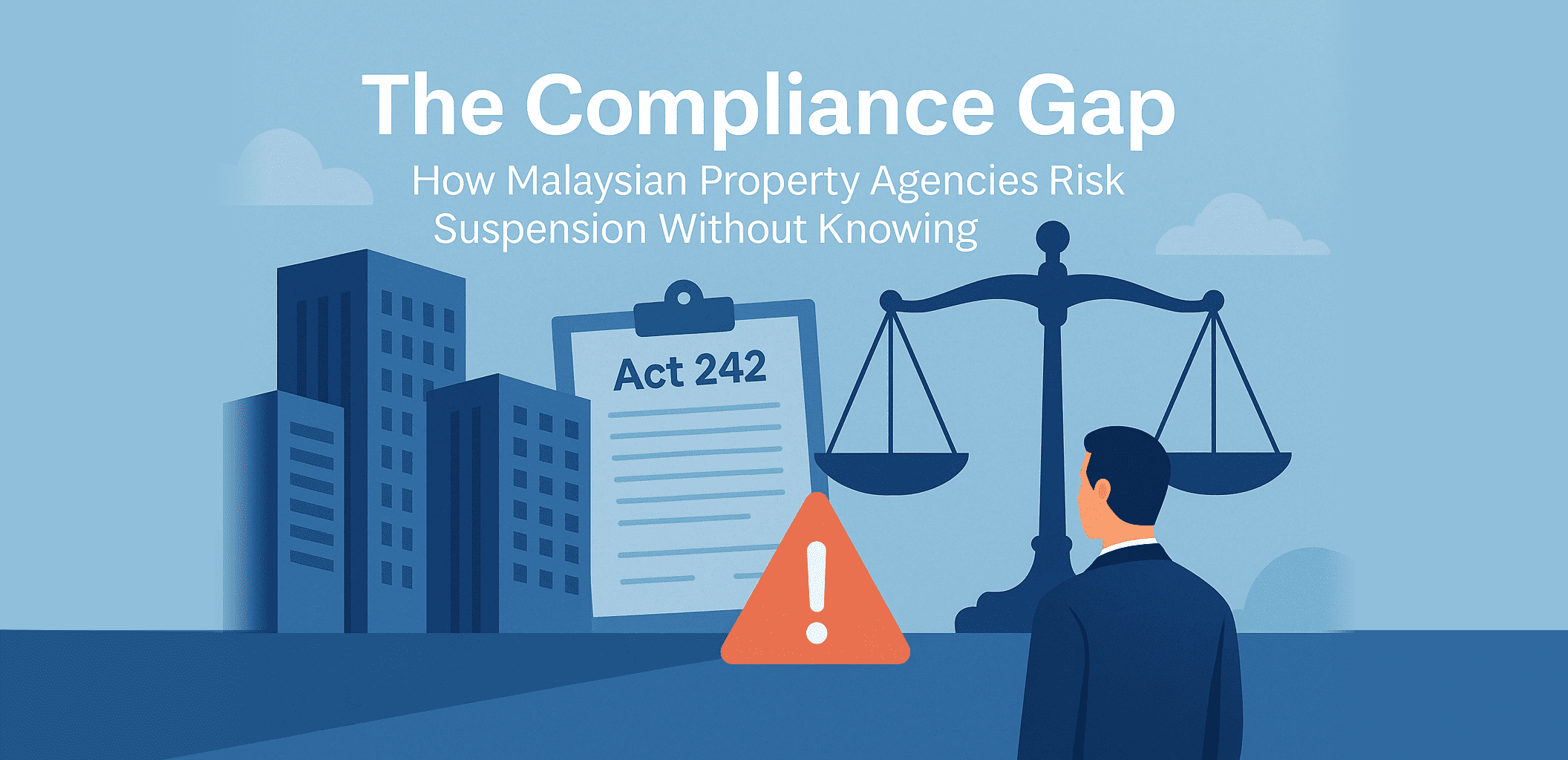The Compliance Gap: How Malaysian Property Agencies Risk Suspension Without Knowing

One complaint. One letter from BOVAEP.
Years of hard work building your agency can collapse overnight.
And it rarely happens because of lack of sales — it happens because of compliance.
In Malaysia’s competitive property market, agency principals are focused on the numbers: listings secured, deals closed, commission earned. They pour energy into training negotiators on sales techniques, lead generation, and closing deals.
But beneath the surface, a silent threat grows. Many successful agencies are operating with a dangerous Compliance Gap: the widening chasm between their sales activity and their adherence to the legal framework governing the profession.
What is the Compliance Gap?
The Compliance Gap isn’t about intentional fraud. It’s the result of everyday shortcuts, outdated processes, and a fundamental misunderstanding of where liability truly lies.
It’s the space where:
- Deposits are “temporarily” held in a REN’s personal bank account.
- Appointment letters are generic templates that don’t protect commissions.
- Client data is shared freely on WhatsApp groups without a second thought.
- Ads go live without the mandatory REA license number.
- Principals are too busy scaling to properly supervise 30+ negotiators.
On their own, each seems minor. Together, they form a pattern regulators may interpret as a serious breach of duty.
The Three Root Causes of the Compliance Gap
1. The Delegation Disaster
As agencies grow, principals naturally delegate. The day-to-day work of listings, viewings, and negotiations falls to RENs.
The problem? Compliance is often delegated by default, not by design.
RENs, with minimal legal training, are making critical decisions with legal consequences. The principal, who retains 100% of the liability under Act 242, is often the last to know when a line has been crossed.
2. The Myth of “We’ve Always Done It This Way”
The industry evolves faster than internal processes. A practice common five years ago (like buying lead lists) is now a direct PDPA breach.
Agencies relying on “tribal knowledge” instead of updated SOPs create a culture where non-compliance becomes the norm simply because no one stops to ask: “Is this actually legal?”
3. The Invisible Liability
Unlike an empty sales pipeline, compliance risks are invisible — until they explode.
- There’s no warning light when a REN misrepresents a property.
- No automatic alert when a negotiator fails to file an AMLA Suspicious Transaction Report (STR).
- The first sign of a problem is often the penalty itself.
How the Gap Can Escalate: A Real-World Scenario
The Shortcut: A high-performing REN verbally promises a buyer that an upcoming LRT station will be “500 meters away.” The claim is exaggerated.
The Breach: The buyer purchases based on this misrepresentation. Later, they discover the station is 2km away.
The Complaint: The buyer files a formal complaint against the agency and the principal (the REA).
The Investigation: During review, the authorities discover there are no training records on misrepresentation and no system for approving REN marketing claims.
The Amplification: Further checks reveal that several Facebook ads by the agency’s RENs are missing license numbers.
The Risk: At this point, regulators may see the issue not as an isolated mistake, but as part of a broader pattern of poor supervision and systemic non-compliance.
Agencies rarely face consequences for a single error. The real danger is when a series of small oversights adds up to a picture of negligence.
Bridging the Gap: From Risk to Resilience
Closing the Compliance Gap isn’t about memorising every law — it’s about building systems that make compliance unavoidable.
- Make Compliance a Leadership Priority – The principal must own compliance. Lead audits, mandate training, and set the tone.
- Systemise Everything –
- Replace WhatsApp and verbal promises with a CRM that logs client interactions.
- Use a centralised ad approval system before anything goes live.
- Implement legally-vetted templates for appointment letters, co-broking agreements, and REN contracts.
- Invest in Continuous Training – Don’t rely on the initial REN course. Hold quarterly updates on PDPA, Act 242, AMLA, and ethical sales practices.
- Create a Culture of Accountability – Reward negotiators for doing things right, not just fast. Treat compliance breaches as serious offences, not small slips.
Final Word: Compliance is Your Business’s Immune System
You don’t wait to get sick to start thinking about your health. Similarly, you can’t wait for a suspension notice to start building compliance into your business.
The Compliance Gap is the single greatest unmanaged risk facing Malaysian property agencies today. Principals who will thrive in the coming years are those who understand: compliance is not a cost — it’s the foundation of a sustainable, reputable, and resilient business.
👉 Is your agency exposed? Start with an internal audit. Review your processes against this checklist — if you see gaps, act now. The survival of your license depends on it.











































































































